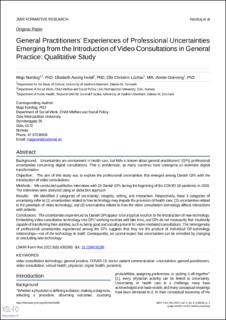General Practitioners’ Experiences of Professional Uncertainties Emerging from the Introduction of Video Consultations in General Practice: Qualitative Study
Peer reviewed, Journal article
Published version
Permanent lenke
https://hdl.handle.net/11250/3020071Utgivelsesdato
2022-06-14Metadata
Vis full innførselSamlinger
- Publikasjoner fra Cristin [3269]
- SAM - Institutt for sosialfag [471]
Originalversjon
https://doi.org/10.2196/36289Sammendrag
Background: Uncertainties are omnipresent in health care, but little is known about general practitioners’ (GPs) professional uncertainties concerning digital consultations. This is problematic, as many countries have undergone an extensive digital transformation.
Objective: The aim of this study was to explore the professional uncertainties that emerged among Danish GPs with the introduction of video consultations.
Methods: We conducted qualitative interviews with 15 Danish GPs during the beginning of the COVID-19 pandemic in 2020. The interviews were analyzed using an abductive approach.
Results: We identified 3 categories of uncertainty: integrity, setting, and interaction. Respectively, these 3 categories of uncertainty refer to (1) uncertainties related to how technology may impede the provision of health care; (2) uncertainties related to the potentials of video technology; and (3) uncertainties related to how the video consultation technology affects interactions with patients.
Conclusions: The uncertainties experienced by Danish GPs appear to be a typical reaction to the introduction of new technology. Embedding video consultation technology into GPs’ working routines will take time, and GPs do not necessarily feel intuitively capable of transferring their abilities, such as being good and socially present for video-mediated consultations. The heterogeneity of professional uncertainties experienced among the GPs suggests that they are the product of individual GP-technology relationships—not of the technology in itself. Consequently, we cannot expect that uncertainties can be remedied by changing or precluding new technology.

